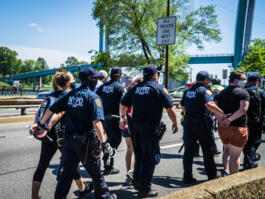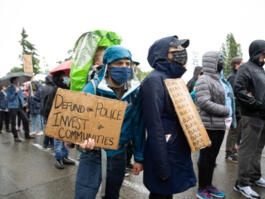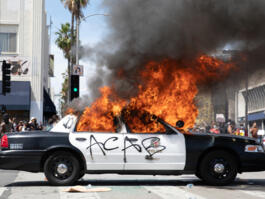Most Want ‘Blue Lives Matter’ Laws to Protect Police, Fear for Public Safety
Most voters believe there is a war on police in America today and want to make attacks on cops punishable as a hate crime. Blacks worry most that these attacks will make their communities less safe.
The latest Rasmussen Reports national telephone and online survey finds that 59% of Likely U.S. Voters think there is a war on police going on. That’s up from 43% two years ago and up from a previous high of 58% in 2015. Just 29% disagree, while 12% are undecided. (To see survey question wording, click here.)
Fifty-nine percent (59%) also support the adoption of a Blue Lives Matter law in their state that would make attacks on police and first responders a hate crime and increase the penalties for such attacks. That’s unchanged from 2016 when Louisiana became the first of more than a dozen states to adopt such a law. Only 25% oppose a Blue Lives Matter law where they live. Sixteen percent (16%) are not sure.
Sixty-eight percent (68%) of voters are concerned that deadly attacks on the police will lead to a shortage of police officers and reduce public safety where they live, with 44% who are Very Concerned. Thirty percent (30%) don’t share that concern, but that includes only 14% who are Not At All Concerned.
Whites (63%) are bigger supporters of Blue Lives Matter laws than blacks (52%) and other minority voters (49%). But blacks (84%) are a lot more concerned than whites (66%) and other minorities (70%) about a potential shortage of police officers in their community.
(Want a free daily e-mail update? If it's in the news, it's in our polls). Rasmussen Reports updates are also available on Twitter or Facebook.
The survey of 1,000 Likely U.S. Voters was conducted September 15-16, 2020 by Rasmussen Reports. The margin of sampling error is +/- 3 percentage points with a 95% level of confidence. Field work for all Rasmussen Reports surveys is conducted by Pulse Opinion Research, LLC. See methodology.
Sixty-seven percent (67%) of Americans rate the performance of the police in the area where they live as good or excellent. Just 20% believe the tactics used by their local police are too harsh.
Following the assassination attempt on two Los Angeles County police officers this past weekend, most whites, blacks and other minority voters are in general agreement that there is a war on police in America today.
Republicans (80%) are twice as likely as Democrats (39%) to believe there is a war on police going on. Sixty percent (60%) of voters not affiliated with either major party agree.
Democrats (45%) are far less supportive of a Blue Lives Matter in their state than GOP voters (79%) and unaffiliateds (55%) are.
Sizable majorities in most demographic categories worry that deadly attacks on the police will lead to a shortage of cops and reduce public safety in their community.
Since Black Lives Matter anti-police protests began this summer, attacks on police have increased. Sixty-six percent (66%) of Americans oppose defunding the police in the community where they live. Sixty-one percent (61%) believe violent crime is likely to go up in communities that defund the police.
Forty-two percent (42%) of voters say there have been anti-police protests in their community this summer, and 48% of these voters say those protests have turned violent.
Additional information from this survey and a full demographic breakdown are available to Platinum Members only.
Please sign up for the Rasmussen Reports daily e-mail update (it's free) or follow us on Facebook. Let us keep you up to date with the latest public opinion news.
The survey of 1,000 Likely U.S. Voters was conducted September 15-16, 2020 by Rasmussen Reports. The margin of sampling error is +/- 3 percentage points with a 95% level of confidence. Field work for all Rasmussen Reports surveys is conducted by Pulse Opinion Research, LLC. See methodology.
Rasmussen Reports is a media company specializing in the collection, publication and distribution of public opinion information.
We conduct public opinion polls on a variety of topics to inform our audience on events in the news and other topics of interest. To ensure editorial control and independence, we pay for the polls ourselves and generate revenue through the sale of subscriptions, sponsorships, and advertising. Nightly polling on politics, business and lifestyle topics provides the content to update the Rasmussen Reports web site many times each day. If it's in the news, it's in our polls. Additionally, the data drives a daily update newsletter and various media outlets across the country.
Some information, including the Rasmussen Reports daily Presidential Tracking Poll and commentaries are available for free to the general public. Subscriptions are available for $4.95 a month or 34.95 a year that provide subscribers with exclusive access to more than 20 stories per week on upcoming elections, consumer confidence, and issues that affect us all. For those who are really into the numbers, Platinum Members can review demographic crosstabs and a full history of our data.
To learn more about our methodology, click here.





